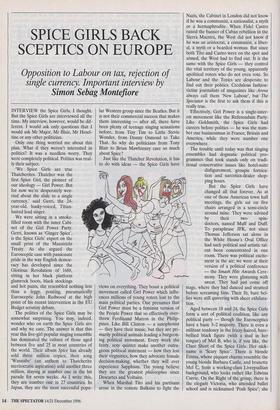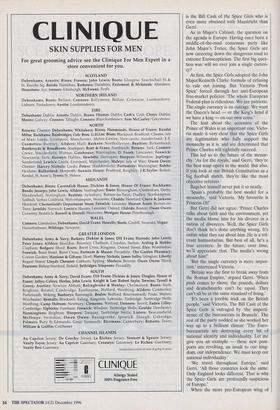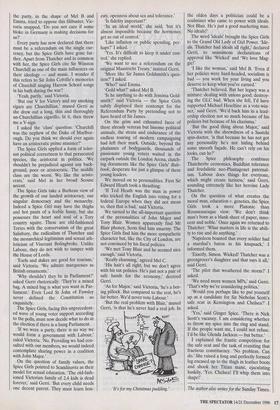SPICE GIRLS BACK SCEPTICS ON EUROPE
Opposition to Labour on tax, rejection of single currency. Important interview by Simon Sebag Montefiore
INTERVIEW the Spice Girls, I thought. But the Spice Girls are interviewed all the time. My interview, however, would be dif- ferent. I would ask only questions that I would ask Mr Major, Mr Blair, Mr Hesel- tine or any other politician.
Only one thing worried me about this plan. What if they weren't interested in politics? It was a needless worry. They were completely political. Politics was real- ly their subject.
'We Spice Girls are .true Thatcherites. Thatcher was the first Spice Girl, the pioneer of our ideology — Girl Power. But for now we're desperately wor- ried about the slide to a single currency,' said Gerri, the 24- year-old, husky-voiced, Titian- haired lead singer.
We were sitting in a smoke- filled room with the inner Cabi- net of the Girl Power Party. Gerri, known as 'Ginger Spice', is the Spice Girls' expert on the small print of the Maastricht Treaty. As she argued the Eurosceptic case with passionate pride in the way English democ- racy has developed since the Glorious Revolution of 1688, sitting in her black platform glamrock boots, black stockings and hot pants, she resembled nothing less than a leggy, pouting, pneumatically Eurosceptic John Redwood at the high point of his recent intervention in the EU Budget scrutiny debate.
The politics of the Spice Girls may be somewhat surprising. You may, indeed, wonder who on earth the Spice Girls are and why we care. The answer is that this year this five-girl popular singing ensemble has dominated the culture of those aged between five and 25 in most countries of the world. Their album Spice has already sold three million copies; their song `Wannabe' (an anthem to Thatcherite meritocratic aspiration) sold another three million, staying at number one in the hit parade for seven weeks. As I write this, they are number one in 27 countries. In Japan, they are the most successful popu- tar Western group since the Beatles. But it is not their commercial success that makes them interesting — after all, there have been plenty of teenage singing sensations before, from Tiny Tim to Little Stevie Wonder, from Donny Osmond to Take That. So why do politicians from Tony Blair to Brian Mawhinney care so much about Spice?
Just like the Thatcher Revolution, it has to do with ideas — the Spice Girls have views on everything. They boast a political movement called Girl Power which influ- ences millions of young voters lost to the main political parties. One presumes that Girl Power must be a feminist version of the People Power that so effectively over- threw Ferdinand Marcos in the Philip- pines. Like Bill Clinton — a saxophonist — they have their music, but they are pri- marily political animals leading a burgeon- ing political movement. Every week the feisty, sexy quintet make another outra- geous political statement — how they lost their virginities, how they advocate female decision-making, whether they will ever experience Sapphism. The young believe they are the greatest philosophes since Descartes and Voltaire.
When Marshal Tito and his partisans arose in the remote Balkans to fight the Nazis, the Cabinet in London did not know if he was a communist, a nationalist, a myth or a hermaphrodite. When Fidel Castro raised the banner of Cuban rebellion in the Sierra Maestra, the West did not know if he was an aristocrat, a communist, a liber- al, a myth or a bearded woman. But since both Tito and Castro were on the spot and armed, the West had to find out. It is the same with the Spice Girls — they control the vital territory of the young, apparently apolitical voters who do not even vote. So Labour and the Tories are desperate to find out their politics. Credulous fashion- victim journalists of magazines like Arena always call them 'New Labour', but The Spectator is the first to ask them if this is really true.
Effectively, Girl Power is a single-inter- est movement like the Referendum Party. Like Goldsmith, the Spice Girls had careers before politics — he was the num- ber one businessman in France, Britain and America, while they were number one everywhere.
The trouble until today was that singing ensembles had dogmatic political pro- grammes that took stands only on tradi- tional conservative issues like hotel-suite disfigurement, groupie fornica- tion and narcotics-dealer shop- ping hours.
But the Spice Girls have changed all that forever. As at one of those American town hall meetings, the girls sat on five chairs arranged in a semi-circle around mine. They were advised by their two spin- doctors, named Muff and Duff. To paraphrase JFK, not since Thomas Jefferson sat alone in the White House's Oval Office had such political and artistic tal- ent been concentrated in one room. There was political excite- ment in the air; we were at their version of a political conference — the Smash Hits Awards Cere- mony. They were glistening with sweat. They had just come off stage, where they had danced and strutted before screaming fans. Their fit, bare bel- lies were still quivering with sheer exhilara- tion.
Aged between 18 and 24, the Spice Girls form a sort of political coalition, like any political party — though the Eurosceptics have a basic 3-2 majority. There is even a militant tendency in the frizzy-haired, bare- bellied black figure (with a stud in her tongue) of Mel B, who is, if you like, the Clare Short of the Spice Girls. Her nick- name is 'Scary Spice'. There is blonde Emma, whose piquant charms resemble the young blonde Barbara Castle, and brunette Mel C, from a working-class Liverpudlian background, who looks rather like Edwina Currie. On the Right of the group, there is the elegant Victoria, who attended ballet school and is nicknamed 'Posh Spice'; she is the Bill Cash of the Spice Girls who is even more obsessed with Maastricht than Gerri.
As in Major's Cabinet, the question on the agenda is Europe. Having once been a middle-of-the-road consensus party like John Major's Tories, the Spice Girls are now careering down the dangerous road to extreme Euroscepticism. The first big ques- tion was: will we ever join a single curren- cy?
At first, the Spice Girls adopted the John Major/Kenneth Clarke formula of refusing to rule out joining. But Victoria 'Posh Spice' forced through her anti-European free-market policies: 'The whole European Federal plan is ridiculous. We are patriotic. The single currency is an outrage. We want the Queen's head — or the King's head if we have a king — on our own coins.'
The hint about the accession of the Prince of Wales is an important one, Victo- ria made it very clear that the Spice Girls are legitimatists who fully support the monarchy as it is, and are determined that Prince Charles will rightfully succeed.
This led us to the future of the monar- chy. 'As for the royals,' said Gerri, 'they're the best soap opera in the world. But also, if you look at our British Constitution as a big football match, they're like the most objective referees.'
Bagehot himself never put it so neatly.
`Spain's probably the best model for a monarchy,' said Victoria. 'My favourite is Princess Di!'
But Gerri did not agree. 'Prince Charles talks about faith and the environment, yet the media blame him for his divorce in a nation of divorcees. Well, the Spice Girls don't think he's done anything wrong. It's unfair what they say about him. He is a tol- erant humanitarian. But best of all, he's a true eccentric. In the future, over time, we'll appreciate that. The media's wrong about him!'
'But the single currency is more impor- tant,' intervened Victoria.
'Britain was the first to break away from the Roman Empire,' argued Gerri. 'When push comes to shove, the pounds, dollars and deutschmarks can't be equal. They can't all be at the same standard of living.'
'It's been a terrible trick on the British people,' said Victoria. The Bill Cash of the Spice Girls is outraged by 'the imperti- nence of the bureaucrats in Brussels'. The rest of the party nodded as she worked her way up to a brilliant climax: 'The Euro- bureaucrats are destroying every bit of national identity and individuality. Let me give you an example — those new pass- ports are revolting, an insult to our king- dom, our independence. We must keep our national individuality.'
'We travel throughout Europe,' said Gerri. 'All those countries look the same. Only England looks different. That is why the Spice Girls are profoundly suspicious of Europe.'
When the more pro-European wing of the party, in the shape of Mel B and Emma, tried to oppose this filibuster, Vic- toria snapped, 'Do you not care if some bloke in Germany is making decisions for us?'
Every party has now declared that there must be a referendum on the single cur- rency, but the Spice Girls have gone fur- ther. Apart from Thatcher and in common with her, the Spice Girls cite Sir Winston Churchill as one of the main influences on their ideology — and music. I wonder if this refers to Sir John Colville's memories of Churchill singing Harrow School songs in his bath during the war?
`Yeah, partly,' said Victoria. `But our V for Victory and my smoking cigars are Churchillian,' mused Gerri as she drew out a long, thin and thoroughly un-Churchillian cigarillo, lit it, then threw me a V-sign. I asked the 'class' question: 'Churchill was the nephew of the Duke of Marlbor- ough. Do you think we should ever again have an aristocratic prime minister?'
The Spice Girls applied a form of toler- ant political correctness to that persecuted species, the aristocrat in politics. 'We shouldn't be prejudiced against any back- ground, poor or aristocratic. The middle class are the worst. We like the aristo- crats,' said Mel in her broad Scouse accent.
The Spice Girls take a Burkean view of the growth of our landed aristocracy, our singular democracy and the monarchy. Indeed a Spice Girl may have the thighs and hot pants of a feeble hussy, but she possesses the heart and soul of a Tory country squire. These are old-fashioned Tories with the conservatism of the great Salisbury, the radicalism of Thatcher and the monarchical legitimism and sexual ath- leticism of Viscount Bolingbroke. Unlike Labour, they do not wish to tamper with the House of Lords.
'Earls and dukes are good for tourism,' said Victoria. 'We admire marquesses as British ornaments.'
'Why shouldn't they be in Parliament?' asked Gerri rhetorically. 'They're a mixed bag. A mixed bag is what you want in Par- liament.' Even Lord St John of Fawsley never defined the Constitution so exquisitely.
The Spice Girls, facing this unprecedent- ed wave of young voter support according to the polls, must now decide what to do at the election if there is a hung Parliament.
'If we were a party, there is no way we would form a government with Labour,' ruled Victoria. 'No. Providing we had con- sulted with our members, we would indeed contemplate sharing power in a coalition with John Major.'
On the question of family values, the Spice Girls pointed to Scandinavia as their model for sexual education. 'The old-fash- ioned Victorian family of 2.4 kids is dead forever,' said Gerri. 'But every child needs one decent parent. They must learn hon- esty, openness about sex and tolerance.'
'Is fidelity important?'
'In an ideal world,' she said, 'but it's almost impossible because the hormones get so out of control.'
'Like inflation or public spending, per- haps?' I asked.
'Yes. It's difficult to keep it under con- trol,' she replied.
'We want to see a referendum on the original Maastricht Treaty,' insisted Gerri.
'More like Sir James Goldsmith's ques- tion?' I asked.
'Who?' said Emma.
'Gold what?' asked Mel B.
'Is he anything to do with Jemima Gold- smith?' said Victoria — the Spice Girls subtly displayed their contempt for the Referendum Party by pretending not to have heard of Sir James.
On the grim and exhausted faces of these already veteran but lissome political animals, the strain and endurance of the endless touring of modern campaigning had left their mark. Outside, beyond the phalanxes of bodyguards, thousands of passionate young voters waited in the carpark outside the London Arena, clutch- ing documents like the Spice Girls' Rule- book, desperate for just a glimpse of these young leaders.
We moved on to personalities. First Sir Edward Heath took a thrashing: 'If Ted Heath was the man in power who tricked the English into voting for a federal Europe when they did not mean to, then that is bad,' said Victoria.
We turned to the all-important question of the personalities of John Major and Tony Blair. Women apparently find Mr Blair phoney, Scots find him smarmy. The Spice Girls find him the more sympathetic character but, like the City of London, are not convinced by his fiscal policies.
'We met Tony Blair and he seemed nice enough,' said Victoria.
'Really charming,' agreed Mel C.
'His hair's all right, but we don't agree with his tax policies. He's just not a pair of safe hands for the economy,' decreed Gerri.
'As for Major,' said Victoria, 'he's a bor- ing pillock. But compared to the rest, he's far better. We'd never vote Labour.'
'But the real problem with Blair,' mused Gerri, Is that he's never had a real job. In 'It's for my Christmas pudding.' the olden days a politician could be a coalminer who came to power with ideals. Not Blair. He's just a good marketing man. No ideals!'
The word 'ideals' brought the Spice Girls to the Grand Old Lady of Girl Power. 'Ide- als. Thatcher had ideals all right,' declared Gerri, to unanimous declarations of approval like 'Wicked' and 'We love Mag- gie!'
'I like the woman,' said Mel B. 'Even if her policies were hard-headed, socialism is bad — you work for your living and you deserve to keep what you've earned.'
'Thatcher believed. But her legacy was a mixture: dealing with unions good; destroy- ing the GLC bad. When she fell, I'd have supported Michael Heseltine as a vote-win- ner,' said Gerri. `We'd back him in a lead- ership election not so much because of his policies but because of his charisma.'
'But the good thing about Major,' said Victoria with the shrewdness of a Saatchi spin-doctor, `is that because he has not got any personality he's not hiding behind some smooth façade. He can't rely on his looks, can he?'
The Spice philosophy combines Thatcherite economics, Buddhist tolerance and feudalistic neo-Plantagenet paternal- ism. 'Labour does things for everyone, which might create laziness,' said Gerri, sounding extremely like her heroine Lady Thatcher.
On the question of what creates the moral man, education v. genetics, the Spice Girls took a more Platonic than Rousseauesque view: 'We don't think man's born as a blank sheet of paper, inno- cent and noble.' Once again we returned to Thatcher: 'What matters in life is the abili- ty to rise and do anything.'
`Napoleon boasted that every soldier had a marshal's baton in his knapsack,' I informed them.
'Exactly, Simon. Wicked! Thatcher was a greengrocer's daughter and that says it all,' said Gerri.
'The pilot that weathered the storm?' I asked.
`We need more women MPs,' said Gem. `That's why we're considering politics.'
'Would you perhaps like to put yourself up as a candidate for Sir Nicholas Scott's safe seat in Kensington and Chelsea?' I asked.
'Yes,' said Ginger Spice. 'There is Nick Scott's vacancy. I am considering whether to throw my spice into the ring and stand. If the people want me, I could not refuse. I'd be like Glenda Jackson — but better.'
I explained the frantic competition for the safe seat and the task of reuniting that fractious constituency. 'No problem. Can do.' She raised a long and perfectly formed leg encased up to the thigh in leather boots and shook her Titian mane, ejaculating huskily, 'Yes. Chelsea! I'll whip them into shape!'
The author also writes for the Sunday Times.




















































































































 Previous page
Previous page